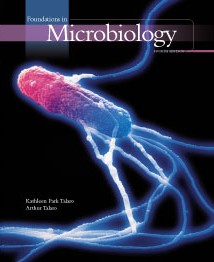 |  Foundations in Microbiology, 4/e Kathleen Park Talaro,
Pasadena City College
Arthur Talaro
Drugs, Microbes, Host: The Elements of Chemotherapy
Chapter Overview- Antimicrobial chemotherapy is the treatment and prevention of infectious diseases by means of chemicals called drugs.
- Antimicrobial drugs include antibiotics derived from bacteria and fungi, and synthetic drugs produced by chemical reactions.
- Narrow-spectrum antimicrobial drugs affect a small range of microbes, and broad-spectrum drugs affect a wider range of microbes.
- Chemotherapy involves a complex interaction between the microbe, drug, and host.
- The best antimicrobial drugs have low toxicity to humans and lack other side effects such as drug resistance, allergy, and disruption of natural flora.
- The primary action of antimicrobial drugs is to interfere with some specific component of the microbe’s structure, its enzymes, or synthesis of proteins and other molecules.
- Drug resistance is a process by which microbes develop genetic changes that allow them to circumvent the effects of a drug.
- Hundreds of drugs have been developed for treating bacterial, fungal, protozoan, helminthic, and viral infections.
- The predominant antibacterial drug classes are the penicillins, cephalosporins, tetracyclines, sulfa drugs, and fluoroquinolones.
- Selecting a drug for therapy is based upon the microbe’s sensitivity to the drug, the drug’s toxicity, and the health of the patient.
- Adverse side effects of drugs include damage to skin, liver, kidney, circulatory system, nervous system, and gastrointestinal tract.
- Drugs may cause allergies and disrupt the host’s normal flora, leading to other infections.
- Antimicrobial drugs are often overprescribed, ineffective, taken in incorrect doses for too short a time, and broadcast into the environment in livestock feeds.
- People need to become aware of the correct guidelines for drug therapy as a way to protect drug diversity and prevent drug resistance.
|
|


 2002 McGraw-Hill Higher Education
2002 McGraw-Hill Higher Education